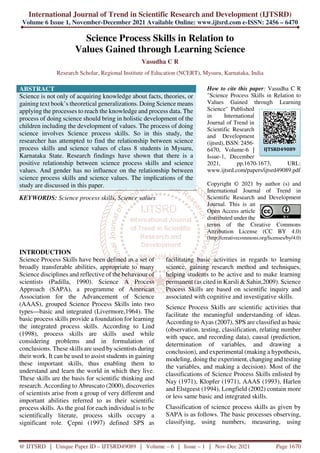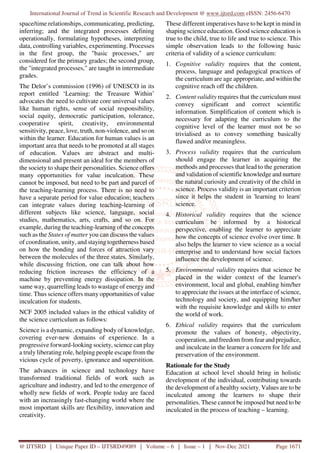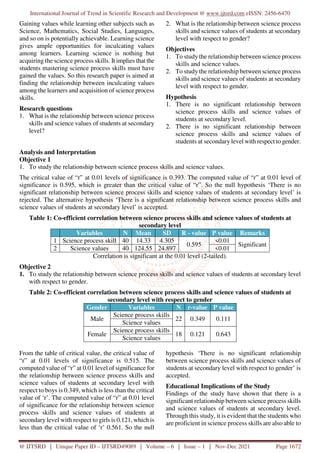This study explores the relationship between science process skills and values among Class 8 students in Mysuru, Karnataka, finding a significant positive correlation. It concludes that proficient science process skills are associated with the achievement of science values, indicating the importance of process-oriented learning in science education. Gender does not significantly influence this relationship, suggesting that all students can benefit equally from a focus on process over content in science teaching.



![International Journal of Trend in Scientific Research and Development @ www.ijtsrd.com eISSN: 2456-6470
@ IJTSRD | Unique Paper ID – IJTSRD49089 | Volume – 6 | Issue – 1 | Nov-Dec 2021 Page 1673
possess the attainment of science values. This implies
for the teacher community and curriculum planners to
ensure the need for focusing on process of learning
rather than focusing on the product. When the focus is
on process of learning, it eventually takes care of
attainment of values along with gaining the
knowledge. It also implies that, if the content of
science text books are process oriented than the
content oriented, it would contribute towards holistic
development of the individuals.
Discussion and Conclusion
Gaining values such as honesty, perseverance,
objectivity, rationality, and sustainabilityat the age of
adolescence along with the knowledge would
eventually make students objective and rational
thinkers along with concern for life. Orienting science
classes towards process rather than the product would
eventually result in the acquisition of values among
the learners. So process oriented science classes not
only providing the knowledge but also make pupils
worthy citizens possessing noble virtues.
References
[1] Creswell, John W. Research Design.
Qualitative, quantitative and mixed methods
approaches. Second edition. University of
Nebraska, Lincoln, Sage Publications,
International Educational and Professional
Publisher, New Delhi.
[2] Maranan, Veronique M. Basic Process Skills
and Attitude toward Science: Inputs to an
enhanced students’ Cognitive Performance.
https://files.eric.ed.gov/fulltext/ED579181.pdf
[3] National Council of Educational Research and
Training. (2005). National Curriculum
Framework. New Delhi. NCERT. (2013).
Pedagpgy of Science, Physical Science Part I,
Textbook for B.Ed. New Delhi: National
Council of Educational Research and Training,
Sri Aurobindo Marg, New Delhi.
[4] Sanderson, B. A., & Kratochvil, D. W. (1971).
SCIENCE—A PROCESS
APPROACHDEVELOPED BY THE
AMERICAN ASSOCIATION FOR THE
ADVANCEMENTOF SCIENCE. Palo Alto,
California: American Institutes for Researchin
the Behavioral Sciences.
https://files.eric.ed.gov/fulltext/ED064066.pdf
[5] UNESCO Principal Regional Office for Asia
and the Pacific (Thailand) [670]. (1993).
Strategies and Methodsfor Teaching Valuesin
the Contextof Scienceand Technology.
UNESCO Principal Regional Office for Asia
and the PacificP.O. Box 967, Prakanong Post
Of LiceBangkok 10110, Thailand (p. 52).
Thailand: UNESCO Principal Regional Office
for Asia and the PacificP.O. Box 967,
Prakanong Post Of LiceBangkok 10110.
https://unesdoc.unesco.org/ark:/48223/pf00000
95247
[6] Cepni, S. (2007). Araştırma ve Proje
çalışmalarına Giriş (Genişletilmiş Üçüncü
Baskı), Trabzon: Celepler Matbaacılık.
[7] Çepni, S., Ayas, A., Johnson, D. & Turgut, M.
F. (1997). Fizik Öğretimi. Ankara: Milli
Eğitimi Geliştirme Projesi Hizmet Öncesi
Öğretmen Eğitimi Deneme Basımı.
[8] Karslı, F., & Şahin Çakır, Ç. (2009).
Developing worksheet based on science process
skills: Factors affecting solubility. Asia-Pacific
Forum on Science Learning and Teaching, 10.
[9] Harlen, W. (1999). Purposes and procedures for
assesing science process skills. Assessment in
Education, 6(1), 129-144.
[10] Choirunnisa, N., Prabowo, P., & Suryanti, S.
(2018). Improving Science Process Skills for
Primary School Students Through 5E
Instructional Model-Based Learning. Journal of
Physics: Conference Series, 947, 012021.
https://doi.org/10.1088/1742-
6596/947/1/012021](https://image.slidesharecdn.com/245scienceprocessskillsinrelationtovaluesgainedthroughlearningscience-220716102333-67145f91/85/Science-Process-Skills-in-Relation-to-Values-Gained-through-Learning-Science-4-320.jpg)